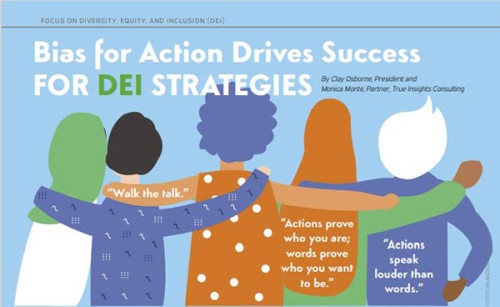“Walk the talk.” “Actions speak louder than words.” “Actions prove who you are; words rove who you want to be.” These familiar adages capture the top sentiment expressed by employees in every organization when the consulting team at TIC asks what concerns, hopes, or fears they have about their employer’s diversity, equity, and inclusion efforts (DEI Strategies).
There are good reasons behind employees’ fears that management’s lofty DEI strategies may become nothing more than platitudes and empty promises despite the business benefits. DEI progress in corporate America has been slow. Harvard Business Review pointed out that among U.S. companies with 100+ employees:
- The proportion of black men in management increased just slightly—from 3% to 3.3%—from 1985 to 2014.
- White women saw significant gains early on, rising from 22% to 29% of managers from 1985 to 2000, yet their numbers have plateaued since.
- White men dominate tech jobs in Silicon Valley, and nearly 90% of Fortune 500 CEOs are white men. Despite recognizing the need for more representation, only two are black women.
- Globally, women occupy only one in five board seats.
This story is largely echoed for Hispanic and Asian-American populations. And utility line clearance is no exception.
With such unremarkable progress, it’s no wonder employees react with doubt when their company’s leadership posts virtue-signaling proclamations on their websites. To counter disbelief and make real advancement, we recommend a unique approach for developing and implementing strategic plans for DE&I and social responsibility.
Aim for Quick Wins
For many companies, overcoming employee skepticism has been identified as a key hurdle. To overcome this, we encourage a “quick wins” approach to implementation. Companies with a bias for action realize the business benefits more quickly. This will only take place when leadership fully recognizes the overwhelming data confirming that diverse, equitable, inclusive workplace practices positively impact an organization’s profits, productivity, customer satisfaction, problem solving, and innovation—and agrees to take action. Those actions must be visible, swift, and meaningful.
Determine What Matters Most
At TIC, we recognize that no two companies are the same. For each of our clients, we facilitate a series of workshops, focus groups, and surveys not only with their leadership teams but also, for companies like Lewis Tree Service who have distributed workforces, with team members across the country. Based on these activities, we collectively identify key actions—in the specific areas that matter most to that company—which can be taken immediately to demonstrate the company is serious about their diversity, equity, inclusion, and social responsibility imperatives.
When employees see positive changes happening in their organization, especially changes they recommended, it allays their fears that the company will be all talk and no action.
View DE&I as Cultural Change (Not Training)
Even the best-intentioned companies will struggle to achieve DE&I success if they implement their efforts poorly or limit DE&I to a series of training modules. DE&I must be a cultural shift that is actively and intentionally embedded in work practices including recruiting, hiring, advancing, and retaining; coaching and mentoring; designing inclusive work environments, and beyond.
At True Insights Consulting, we believe DE&I and social responsibility strategies work best when they are grounded in a larger goal to be among the top-rated workplaces in an industry. As such, all our DE&I plans begin with that larger goal in mind. How each client embraces DE&I will differ entirely. Initiatives may focus on broader understanding, stronger communication, increased collaboration, heightened community impact, etc. No two strategies are the same.
Make a Long-term Commitment
For each facet of any company’s unique DE&I strategy, there’s a lot to consider and the efforts require time, commitment, and resources from the entire organization, not just Human Resources and/or upper management. However, the payback for this investment is tremendous especially in industries like utility vegetation management that are facing a significant labor shortage amid rapidly shifting demographic, technology, and environmental shifts.
Importantly, DE&I is an essential component of the social pillar of Environmental, Social, and Corporate Governance (ESG). Investors and stakeholders are increasingly applying these non-financial factors as part of their analysis to identify material risks and growth opportunities and measure the ethical impact and sustainability of their investment in a company.
As such, sustained focus on DE&I, with a bias for action, will collectively enable the companies in this industry to stay ahead of these market dynamics to achieve long-term sustainability—and make the world a better place.
This article, by Clay Osborne and Monica Monte, True Insights Consulting, featuring Lewis Tree Service, was originally published in the Mar/Apr 2022 edition of the Utility Arborist Association Newsline.
About the Authors
Clayton Osborne - MCEC, LCSW President, True Insights Consulting LLC; adjunct faculty, Human Capital Management, Executive Leadership Program, St John Fisher College. Executive & Performance coach and consultant specializing in helping organizations leverage the talents of their workforce to achieve performance goals, transformational change, and improved business results. He served as Corporate VP HR, Talent Mgt. and Diversity at Bausch+Lomb, Inc. B+L received national recognition for many of the programs under his direction.
Monica Monte - MBA William E. Simon School of Business, University of Rochester, Partner, True Insights Consulting; President, Monte Marketing Consulting. Monica is an experienced leader in DE&I, marketing, customer experience, human resources, organizational development, and business process. She has provided DE&I, Marketing, and Operations support and consultation to Fortune 500 and start-up organizations, including initiatives resulting in Rochester Top 100 and Inc. 500 lists of Fastest-Growing Private Companies. Managed Bausch+Lomb’s EEO and diversity program that received the Federal EEOC Exemplary Effort Award.
True Insights Consulting’s DE&I Strategic Planning & Implementation services help identify practices that engage teams positively, celebrate areas of strength, correct areas needing improvement. The services help inform future policies and practices that impact employee turnover, engagement, performance, and customer satisfaction—assisting organizations to become the Best Places in Their Industry to Work.




